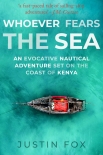Whoever Fears the Sea, Justin Fox [i love reading .TXT] 📗

- Author: Justin Fox
Book online «Whoever Fears the Sea, Justin Fox [i love reading .TXT] 📗». Author Justin Fox
They didn’t have long to wait. A comber loomed astern, unbroken, brimming. Paul looked at Husni. There was probably enough time to harden up and take it head on, but the skipper gave no such command. Perhaps he’d decided Omar’s surfing skills were sufficiently honed. Fayswal had just enough speed to catch the big, hollowing wave. The dhow skated down the face, threatening to bury her prow. Paul and the crew instinctively scrambled to the stern to bring the nose up. Now everyone was shouting in a mixture of excitement and terror. Paul emitted an inarticulate howl that came from somewhere deep inside his chest.
When Fayswal slid off the back of the wave, they found themselves beneath the lighthouse, gliding into calmer water. The light’s comforting beam raked the channel in a sweeping arc above their heads. The moon poked through the clouds again like a cheerleader and the crew responded, breaking into a Swahili shanty that lifted the hair on the back of Paul’s neck. Shela village lay to port, along with a few dhows tugging at their anchors. Guests at the colonial Peponi Hotel sat on the terrace sipping cocktails and watching them pass. The men on Fayswal sang even louder and Paul joined in with any refrain that was repeated, imitating the seductive sounds.
‘Fishing louts,’ he imagined the drinkers muttering into their drinks. Fishing louts indeed, and thank Allah he was one of them! Tears of emotion brimmed in his eyes.
Omar and Paul leant against the dasturi, looking at the moon. ‘They say people have landed there,’ he said.
Paul nodded.
‘Americans,’ Omar said, a hint of disapproval in his voice.
‘Yes,’ said Paul, laughing. ‘Damn Americans, up to no good again.’
He looked at the American moon: full, confident and engorged. The slimmer Islamic version was lean and lethal, with a sharpened edge.
But the loneliness was gone; Hannah had receded. Their dhow was running crisply, propelled by a tropical zephyr into an ancient anchorage. Wherever he looked, boats of every shape and size were anchored in the channel. Fayswal slid past a big jahazi with a tree-trunk mast and Omar gave a low whistle of appreciation. At last, a jahazi in the flesh. Paul marvelled at her graceful lines. At that moment, there was nowhere on earth he’d rather be.
The dancing lights of Lamu stone-town drew closer. Faint Arab music reached them across the water, followed by the smell of spicy food. Paul could make out a line of cannons along the waterfront. Most of the dhows they passed were attractive mashuas like Fayswal, with straight prows and transom sterns, but there were plenty of other types too. They might just as well be approaching any nineteenth-century harbour, where the age of sail had not yet been eclipsed by steam and iron. The crew were buoyed, chatting loudly and calling to fishermen in the anchorage. Paul felt included, one of the out-of-towners creeping into an exotic port.
Shekh and Kijoka lowered the yardarm in a flurry of canvas. The sail bellied out to leeward and engulfed the crew. It was quickly brought under control and furled with strops to the yard. Fayswal described a graceful turn towards the shore, slowing until the prow bit gently into the sand at the southern end of the waterfront. A row of two-storey buildings lined a promenade to their right. His bags were carried ashore on the shoulders of the sailors. Husni said the crew would sleep at a local dosshouse, but first he’d help Paul find a room. Paul felt torn. Earlier, he’d chosen to sail on and not stop at the fishermen’s anchorage of Ziwayu. Now, leaving the crew seemed premature.
Paul bade the men farewell, shaking hands with each one, before a barefoot Husni led him north along the waterfront. Soft lamplight issued from doorways, voices murmured below the seawall. Dhows by the dozen bobbed in the shallows or were tethered to bollards. After the disappointment of Mombasa, Paul was thrilled by what he saw.
Husni ushered him into the lobby of Sunsail Inn, a cheap and clean establishment with an upstairs terrace. Paul had planned to make Lamu his base for research, and decided there and then that this would be his home for the coming weeks. The proprietor showed him to a second storey room. There was a four-poster bed, an overhead fan billowing the mosquito net, and shutters that opened to reveal the waterfront.
Back at reception, Paul handed Husni the rest of the payment. They shook hands and Paul gave him a hug. Husni looked sheepish, but smiled broadly.
‘Thank you for everything. It’s been a pleasure sailing with you. Have a safe voyage back to Malindi.’
‘Maybe we will hang around and do some fishing, catch some more barracuda for you,’ said Husni.
Paul offered an embarrassed grin.
‘Actually,’ Husni continued, ‘I’m thinking of staying on in Lamu for a while and letting the crew sail Fayswal back.’
‘Maybe we’ll see each other around town then?’
‘Yes, maybe. Goodbye. And forget about Somalia.’ They both laughed.
Paul had a quick shower before stepping out to find a restaurant. The New Minaa Top-Roof Café was the only place still serving food. There were plastic tables and chairs, neon lighting and a Kenyan soap opera blaring from the television. The place was packed with locals, all gathered around the set. The chicken tikka and chips filled the gap nicely. Paul jotted notes as he ate, trying to capture details of the voyage. He was watched by a curious waiter who intermittently asked him what he was doing, perhaps in the hope that his answer would eventually change to something more interesting. The soap opera meandered to an incongruous ending and Paul





Comments (0)